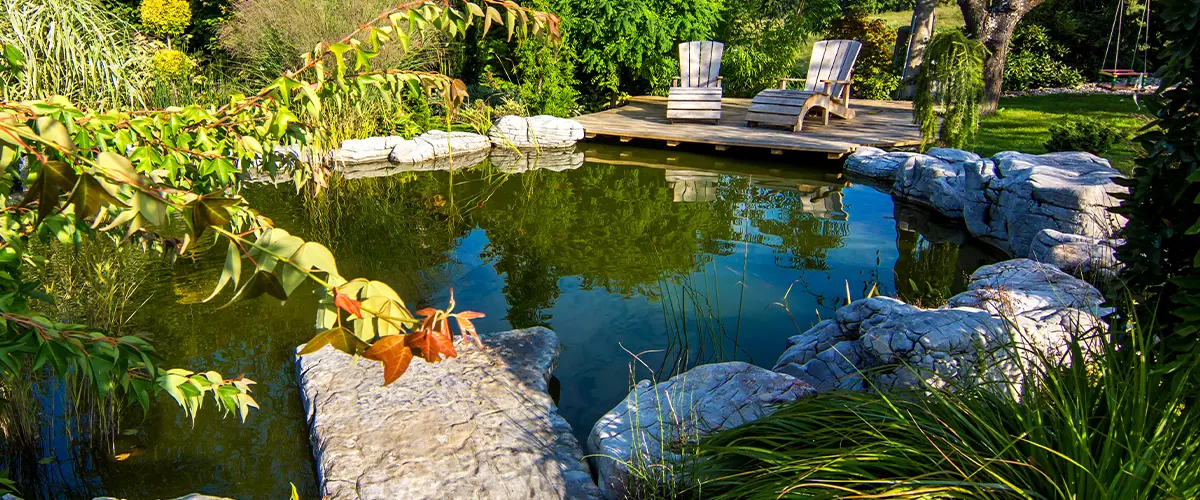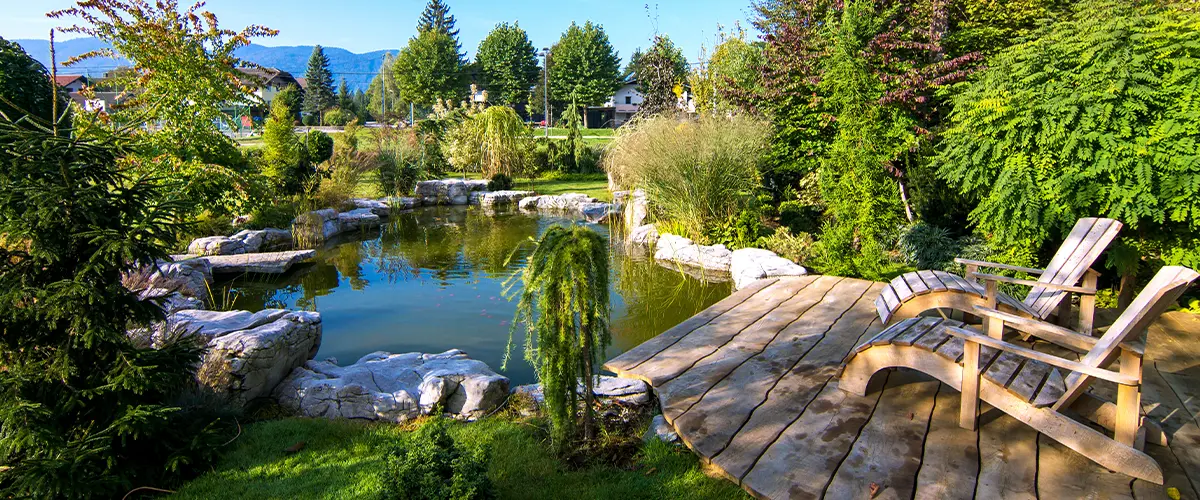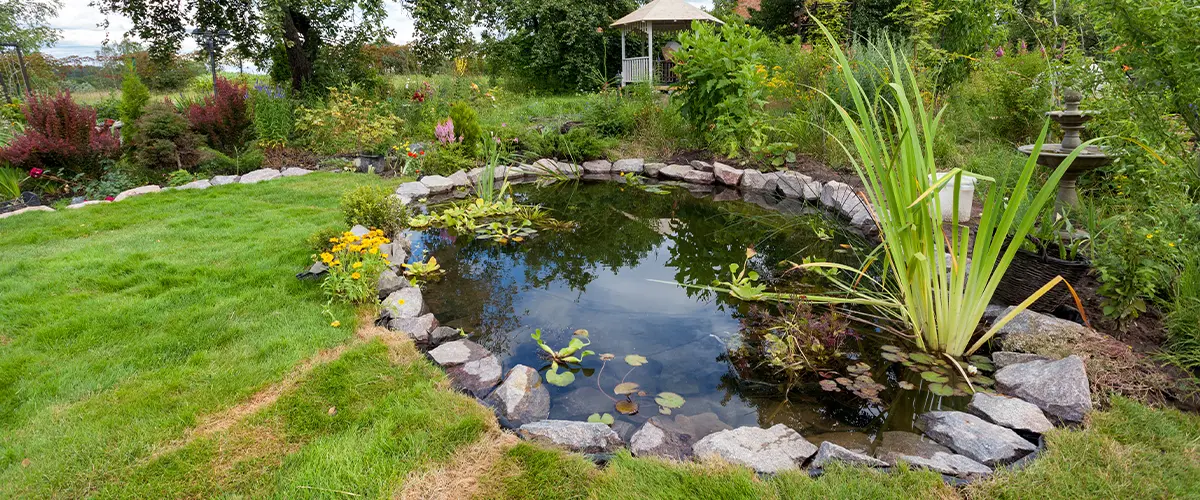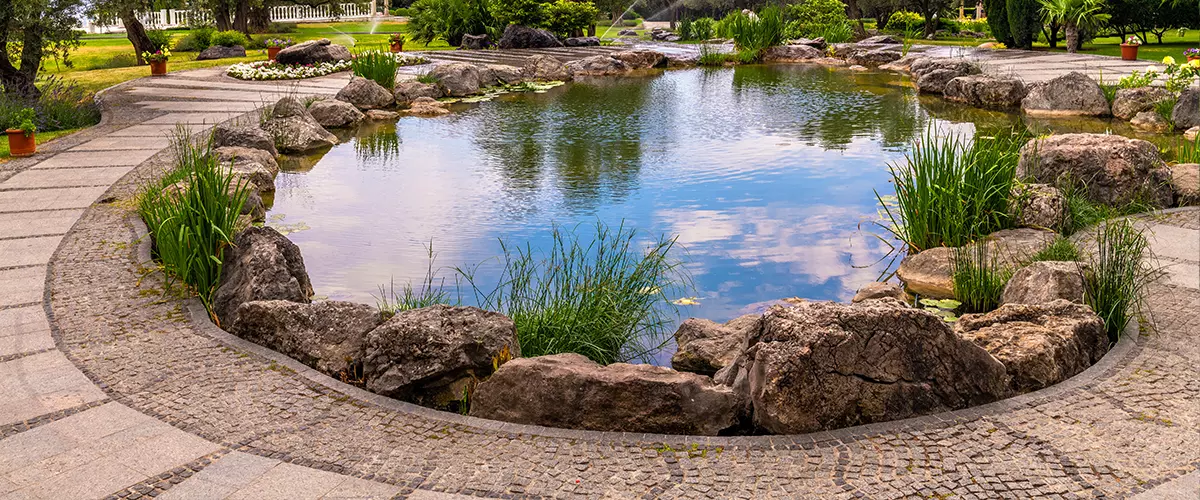Beneficial Bacteria For Ponds In Pensacola
Keeping a pond in Pensacola clear and healthy can be a challenge. One effective solution is introducing beneficial bacteria for ponds.
These natural helpers will break down fish waste, excess nutrients, and organic matter, making your pond water clearer and healthier for aquatic life.

Key Takeaways
- Beneficial bacteria break down fish waste, excess nutrients, and organic matter in Pensacola ponds, leading to clearer and healthier water for aquatic life.
- Adding beneficial bacteria helps control algae growth by consuming the excess nutrients that algae feed on, keeping the pond water clear without harsh chemicals.
- Use beneficial bacteria in your pond when water temperatures are above 50°F (10°C) to maintain a balanced ecosystem and improve water quality for fish and wildlife.
- Follow best practices like adding natural shade with plants and using aeration systems alongside beneficial bacteria to keep your Pensacola pond healthy.
- Avoid using copper-based algaecides as they can harm pets, wildlife, and disrupt your pond's natural balance.
Understanding Beneficial Bacteria for Ponds
Beneficial bacteria for ponds are natural microorganisms that help maintain a healthy pond ecosystem. They work by breaking down organic waste and excess nutrients, promoting clear water and reducing algae problems.
Their importance lies in improving water quality for fish and wildlife.
What they are
Beneficial pond bacteria are tiny, living organisms that play a key role in the natural water purification system of a pond. They break down organic plant material, reduce fish waste, and consume excess nutrients that can lead to algae growth.
These natural bacteria form part of a healthy ecosystem in both man-made and natural ponds.
These microbes turn harmful substances into harmless ones, helping to maintain clear and healthy water.
By adding beneficial bacteria from sources like aquascape beneficial bacteria products, homeowners can support this vital process.
This addition boosts the numbers of these helpful microorganisms to manage nutrient levels more effectively and keep their ponds looking great.
How they work
Beneficial bacteria play a crucial role in maintaining a healthy balance in your pond. They break down waste, sludge, and excess nutrients like nitrogen and phosphorus that can fuel algae growth.
This process helps keep the water clear and prevents issues like murky water and pond scum from taking over. These bacteria are naturally occurring but adding more can speed up the cleaning process.
“Adding beneficial bacteria works with nature to improve pond health.”
They act as tiny cleaners, consuming organic matter and converting harmful substances into less toxic forms. This reduces nutrient levels that cause excessive algae and also enhances oxygen levels in the water.
Oxygen is vital for fish, plants, and other aquatic wildlife to thrive. By using beneficial bacteria products purchased or selecting the best beneficial bacteria strains suited for Pensacola’s climate, you ensure your pond remains vibrant and life-supporting without resorting to harsh chemicals or constant manual cleaning.
Why they are important
Understanding how beneficial bacteria work leads us to their importance in maintaining a healthy pond environment. These tiny workers play a crucial role in breaking down waste, excess nutrients, and other debris that can cloud water and fuel algae growth.
Without enough beneficial bacteria, ponds in Pensacola could face major issues like muck buildup and poor water quality which are detrimental to aquatic plants and wildlife.
Adding beneficial bacteria is a simple solution for homeowners aiming for clear pond water without resorting to harmful chemicals or expensive UV systems. These natural cleaners help reduce nutrient levels, especially nitrogen, which algae feed on.
By maintaining balanced bacteria numbers through regular additions of purchased bacteria, you ensure your pond remains a vibrant part of your garden oasis.
This approach supports clearer water and also promotes healthy soil around the pond area by processing organic material effectively.

Benefits of Using Beneficial Bacteria for Ponds in Pensacola
Reduced waste and excess nutrients
Using beneficial bacteria in your Pensacola pond helps reduce waste and excess nutrients, creating a healthier environment for your aquatic life.
These bacteria break down organic matter that accumulates at the bottom of the pond, preventing it from decaying and releasing harmful compounds into the water.
By reducing waste and excess nutrients, you can maintain a balanced ecosystem within your pond, supporting the well-being of fish and wildlife.
The addition of beneficial bacteria also aids in managing excessive nutrient levels caused by fish waste or overfeeding. This natural approach minimizes the risk of algae blooms while promoting clearer water.
As a result, you’ll spend less time combating algae problems and more time enjoying the beauty of your pristine pond.
Clearer water and fewer algae problems
Beneficial bacteria lead to clearer pond water and help reduce algae problems by breaking down excess nutrients. When the waste and food sources are minimized, there are fewer factors that contribute to algae growth, resulting in improved water clarity.
Using beneficial bacteria can also rebalance the pond ecosystem, creating an environment where fish and wildlife thrive while keeping algae at bay.
In Pensacola, homeowners can rely on beneficial bacteria to maintain their ponds naturally and effectively.
By adding these helpful microorganisms as part of your pond maintenance routine, you can enjoy a cleaner and healthier aquatic environment without resorting to chemical treatments or frequent water changes.
Improved water quality for fish and wildlife
Improved water quality in your pond is vital for the health and well-being of the fish and wildlife that call it home. By using beneficial bacteria, you can create a thriving aquatic environment.
This promotes clearer water while reducing harmful nutrients, providing a healthy habitat for your fish and contributing to the overall well-being of the wildlife around your pond.
Maintaining improved water quality not only benefits the aquatic life but also supports a balanced ecosystem for plants, insects, and visiting wildlife. This ensures an enjoyable and sustainable environment for all living creatures in and around your pond.

How to Use Beneficial Bacteria
When to add them
Adding beneficial bacteria to your pond in Pensacola should ideally be done when the water temperatures reach 50°F (10°C) or above. At this temperature, the bacteria become more active and effectively break down excess nutrients.
This will help prevent algae problems and maintain water quality for fish and wildlife. Regular addition of these bacteria during warmer months can significantly reduce long-term problems caused by too many nutrients and excessive light.
Remember to add bacteria once a month during the spring, summer, and early fall when it comes to maintaining a healthy balance in your water feature. Start growing a clearer, healthier environment for your man-made ponds by adding beneficial bacteria at the right time.
Best practices for application
To maintain a healthy and balanced pond ecosystem, it is essential to apply beneficial bacteria consistently. When using these bacteria in Pensacola ponds, follow best practices for their application.
Prioritize selling beneficial bacteria specifically designed for water gardens and man-made ponds as they are most effective. Ensure the amount of light reaching your pond is controlled to prevent algae problems and slimy coatings.
Avoid adding chemicals like copper-based algaecides and focus on supplementing with one gram of beneficial bacteria per 1,000 gallons of water every month from Aspen Grove Gardens, reducing long-term problems while enhancing the quality of the water garden.
Supplementing with other pond maintenance methods
To maintain your man-made pond in Pensacola, alongside using beneficial bacteria, consider adding natural shade with aquatic plants to reduce algae growth. Regularly remove excess debris and use aeration systems to improve water circulation for better oxygen levels.
Additionally, installing a filtration system can help in trapping dirt, keeping the water clean, and reducing long-term problems associated with algae.
Avoid copper-based algaecides as they may harm pets and wildlife while causing unforeseen challenges in the future of your pond’s ecosystem.

FAQs
Conclusion
In Pensacola, beneficial bacteria for ponds offer numerous advantages. They reduce waste and excess nutrients, leading to clearer water with fewer algae problems. These bacteria also improve water quality for fish and wildlife.
Adding them at the right time and using best practices can maximize their benefits. Regular use of beneficial bacteria helps maintain a healthy pond ecosystem in Pensacola.
Investing in our pond maintenance service helps you enjoy a clean, healthy pond effortlessly. You’ll wish you’d done it sooner! Contact us at (850) 723-0511, and let our team make your pond project a success.
